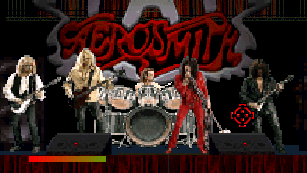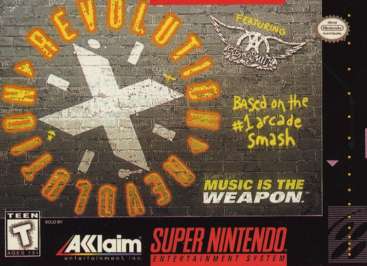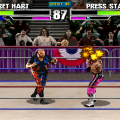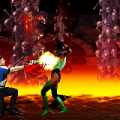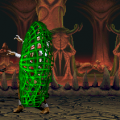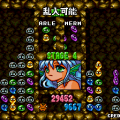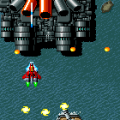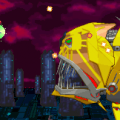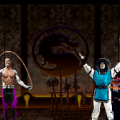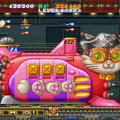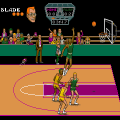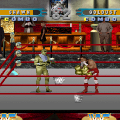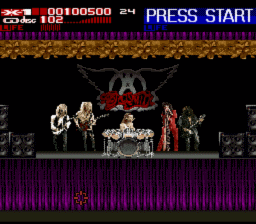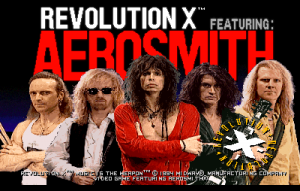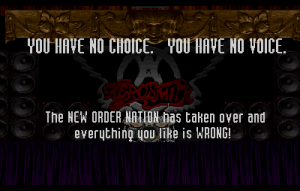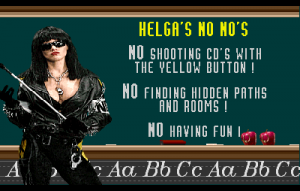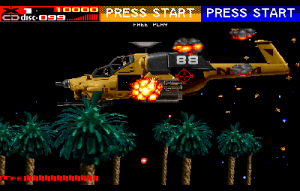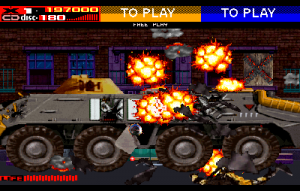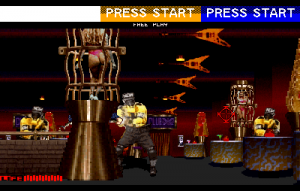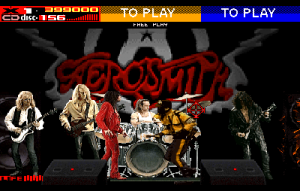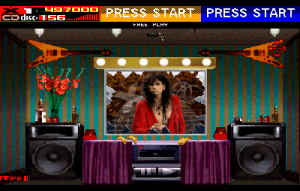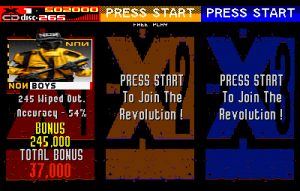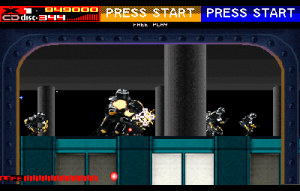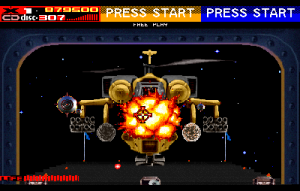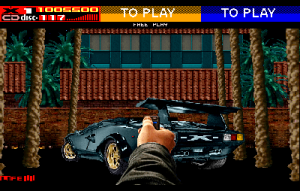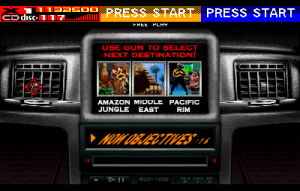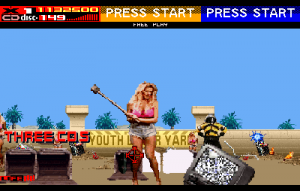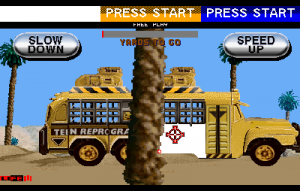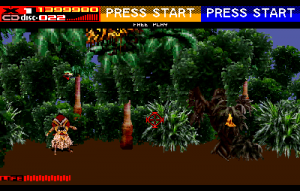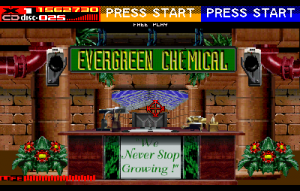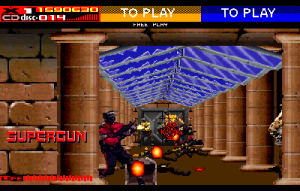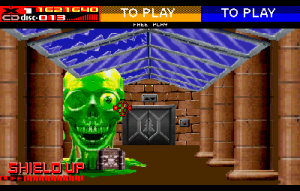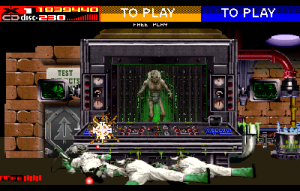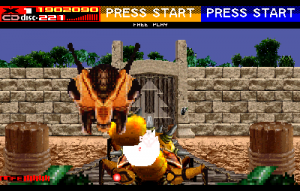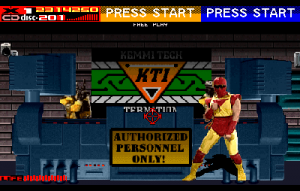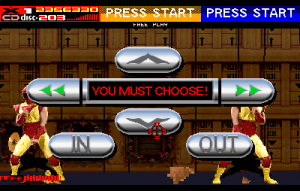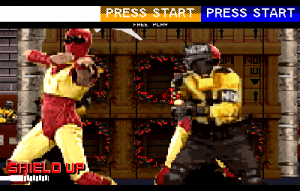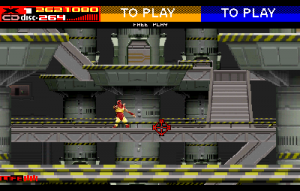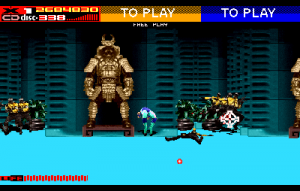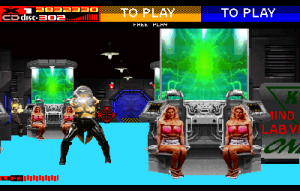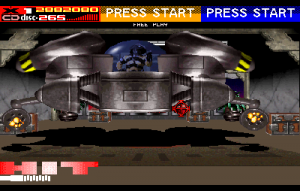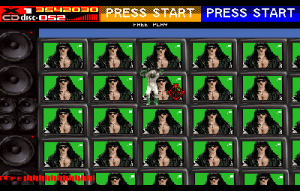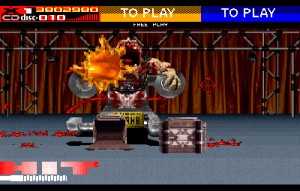Games based on musicians, at least the ones on our shores, have always been pretty uncommon. Before the days of Rock Band and Guitar Hero, all there really was were the arcade and Atari 2600 games based on Journey, along with Michael Jackson’s Moonwalker. In 1994, however, Midway released a light gun game that, without the license, would have basically been a spiritual sequel to their classic Terminator 2 arcade game. …And then they put in Aerosmith.
In a dystopian future where Aerosmith is still relevant, a British dominatrix/schoolteacher and her army of men in gas masks have somehow taken over the entire world. You and up to two other players are on your way to the club to watch Aerosmith play when the New Order Nation assaults the club and kidnaps Aerosmith. Good thing you brought your machine guns to the concert! Basically, the miniscule plot amounts to this: Aerosmith has been kidnapped by stormtroopers on rollerskates. Are you a bad enough dude to rescue Aerosmith?
Revolution X is full of great mid-’90s cheese, and that’s what makes the whole thing more than just a repetitive lightgun shooter. It’s hard to tell if the game actually wants to be taken seriously or not, with its message of “Music is the weapon” and dystopian setting. On the other hand, however, all the digitized sprites are dressed in brightly colored outfits, and the second level is about flying a helicopter through the city, so you can ditch it and drive in Aerosmith’s car instead.
The actual game itself is pretty much one long string of holding down the fire button and mowing down hundreds of identical soldiers. Instead of a regular lightgun, the game uses a mounted machine gun that controls a crosshair on screen. If you play this game emulated, however, the best choice will probably be using a mouse, since that’ll offer you better accuracy.
Each level basically involves generally wandering forward on rails, shooting at every enemy that pops up on screen before they take too much energy from you. This isn’t like Lethal Enforcers where the enemies will give you a second or two before they fire, instead they’ll just start blasting at you the second they appear on screen. Aside from your standard rapid-fire stream of bullets, there’s also a separate button. While in most other games like this, it would have you fire missiles or something along those lines, in this game you fire CDs out of your gun like buzzsaws. And you’re going to need them by the hundreds to have any chance of taking down the bosses, too, since the game makes you destroy every single part of them before they’ll actually die.
Aside from that, though, there’s not much weapon variety at all. While your gun and your CDs can be temporarily powered up, (turning them into laserdiscs, of course) there’s not much to lessen the growing monotony of the game besides its wackiness. The game gives the illusion of branching paths, but a lot of them aren’t much more than a detour that puts you back on the main path, after making you kill a few dozen more soldiers than usual. After the second level, you can also choose from one of three missions in any order, although you have to clear them all to reach the final level.
You’d expect a game of this pedigree to be a quarter muncher, and your health bar is more of a general indicator of how long you get to play the game before it wants another credit. All the enemies fire at you the instant they appear on screen, and bosses shoot so many projectiles that there’s no hope of shooting them all down. This is acceptable if you’re using an emulator, since you can just put in as many credits as you need, but you’d have no chance on an actual arcade cabinet, if you can still find one.
In one stage, you’re supposed to destroy a New Order bus by blowing up every single piece of it, but you’re on a pretty tight time limit. If time runs out before you manage to dismantle it, you’re sent back to the beginning of the level to do it again. It doesn’t send you THAT far back, but the fact that you can’t just credit spam your way past it is a little weird, considering how much of a good strategy it is earlier in the game. There’s also a maze of crates that’s a bit of a pain to get through, since you’re constantly being shot at by soldiers and ninjas while you’re finding your way out, but at least that doesn’t put you under a time limit.
The final stage at Wembley Stadium is actually kind of cool. The only part before the boss involves shooting down a wall of TVs as the New Order’s leader, Mistress Helga taunts you through them. The actual boss fight with her isn’t that tough, until she jumps into her throne and turns into an alien monster named Mondor. And it doesn’t even get that silly until she starts making Holy Grail references as you blow her arms and legs off. If you actually want the game’s best ending where you party with Aerosmith, though, you’ll have to find all five band members hidden throughout the game. When you find them, they’re usually doing something weird, like standing over the toilet or flying over the moon on the guitar.
The game looks pretty decent for the time, even if it doesn’t the technological advantage of using FMV for the backgrounds like Area 51. There’s a lot of zooming and scaling to simulate the look of 3D, which ends up looking pretty fake, especially with how pixilated enemies and objects get when they scale in. The environments have a good bit of destructibility to them, and you’ll frequently have to shoot open windows and break wine bottles to uncover extra CDs and powerups.
The characters themselves are digitized graphics, like the Mortal Kombat series. They only have about two or three frames per animation, however, and the fact that you’ll see each enemy literally about a thousand times quickly gets old. Aside from the standard gas mask clad stormtroopers, there’s roller skating soldiers, brightly colored ninjas (even MORE so than the MK folk), and… spear throwing natives, for some reason. Aerosmith also gave their likenesses to the game, although they don’t actually do much besides give you mission briefings and show up as secrets.
Surprisingly, the soundtrack itself only has four Aerosmith songs, played only at certain points in the game. The band plays “Eat the Rich” in the first level, and the ending music is “Walk this Way”. The rest of the music seems to be standard rock NOT composed by the band, but it still sounds decent anyway. The sound effects are pretty standard, but there’s a lot of cheesy voice acting, including the boss who commands you to “Go to your doom!” as he fires swarms of missiles at you. Steven Tyler serves as the announcer, giving words of encouragement, commenting on powerups you collect, and making Mortal Kombat references when you pick up screen clearing smart bombs.
The game received a few ports not long after the original release, although none of these are really worth playing at all. The Genesis version suffers from the expected cuts in audio and graphical quality, although a lot of the graphics were redrawn in sprite form. It actually gives the game a bit of a charming, almost Amiga-esque look, although the graphics that weren’t touched up looked horrifically grainy. There’s also a couple of tracks that don’t appear in the arcade version, although with the Genesis’s more limited sound chip, you’re not missing a whole lot. On the other hand, it does have some of the clearest digitized speech you’ll ever hear on the Genesis, if you’re into that. A port for the 32X was also planned, but quietly cancelled for obvious reasons.
The Super Nintendo version, although also developed by Rage Software, the same company that made the Genesis port, seems even more unpolished. None of the graphics were redrawn for this version, and all the sprites are tiny and horribly grainy. While it uses the same music as the arcade version, it’s very muffled and shortened, which while understandable due to cartridge limitations, still makes it pretty hard to listen to. It also has the issue of having a gun cursor that controls way too fast to be able to aim well, no matter what setting you put it on in the options menu.
The CD versions for the PS1 and Saturn are both mostly identical. While they’re both much better looking than either of the cartridge releases, they still suffer some degradation, such as missing speech samples and low resolution sprites. Oddly, the game seems to be a little rebalanced for home play, although not very well: You get much more life per credit, but the tradeoff is that some section have WAY more enemies than their arcade counterparts did. While some tracks from the arcade version are missing, the ones that are still there get played in CD-quality, which is nice.
However, all the ports suffer from one major issue: limited credits. All the ports only give you 20 credits to beat the game on, and the Genesis version isn’t even kind enough to tell you how many you actually have. The fact that the game was created in the arcades to suck up as many coins from you as it could means that you’re unlikely to get through without the help of a Game Genie. Plus, there’s no proper light gun support for any of these games – trading in a mouse or the arcade cabinet’s special gun means you’re stuck with a controller, which rarely, if ever, is the best choice for any light gun game.
Is Revolution X a really good game? Not particularly, whether you’re a fan of the band or you hate them. It’s a little repetitive, and it’s blatantly unfair. What it does have, however, is a ridiculous concept and a lot of cheese to support it. From the ridiculously-dressed enemies to Stephen Tyler screaming “TOASTY!” into your ear, it’s a great game to just pick up and laugh your way through. The game, unlike a lot of Midway’s mid-’90s stuff, never ended up on any compilations, so your best bet is to grab MAME, along with a few friends.
Screenshot Comparisons
